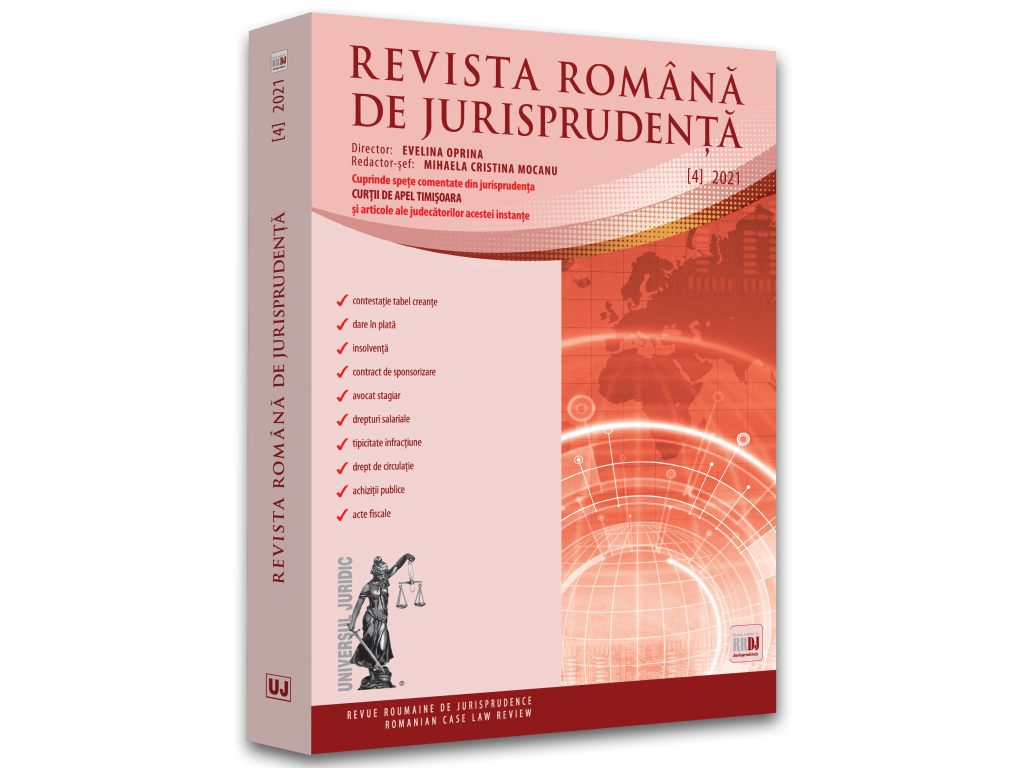Brief considerations regarding the situation of exclusion of economic operators from public procurement procedures governed by the hypothesis provided for in Article 167 para. (1) letter c) of Law no. 98/2016. The notion of „severe work misconduct”. Compe
DEZBATERI
Abstract
The tenderer has the obligation to declare in the DUAE his specific situation, i.e. those aspects which have been held against him by a court of law and which may indicate the existence of work misconduct on the part of this tenderer which may affect his integrity and credibility. Such information should be taken into account when evaluating a tender.
The fact that the tenderer has not been convicted of one of the offences provided for by the law in Art. 164 para. (1) of Law no. 98/2016, a situation which would have led the contracting authority to exclude the tenderer from the procedure, taking into account the incidence of the aforementioned article of law, does not exclude the obligation of the contracting authority to verify the incidence of the hypotheses regulated by the law in art. 167 para. (1) of the same article, in the presence of which the contracting authority is entitled to take the measure of excluding from the procedure for the award of the public procurement contract an economic operator who is in any of the situations referred to in that article.
Where the contracting authority becomes aware of the misconduct of an economic operator participating in an award procedure, it is required to ascertain whether that misconduct is such as to affect its work reputation/credibility, i.e. to ascertain whether the severe work misconduct of which it is aware is such as to cast doubt on its integrity and thus make it unsuitable for being awarded a public contract, even if the economic operator has the technical and economic capacity to perform the contract.
It is therefore for the contracting authorities to assess the effects of any breach of contract which is so serious as to justify the termination of an earlier contract as a result of a loss of confidence. The Court emphasizes that the existence of one of the situations referred to in Article 167 of Law No 98/2016 cannot automatically lead to exclusion from the procedure, as the evaluation committee is bound to respect the principles of equal treatment and proportionality, the effect of which in ensuring the legal certainty of the award procedure is directly influenced by the individual evaluation, ad casum, of the tenderers, through the filter of the documents submitted by them and subsequently clarified by the evaluation committee.
In order to be considered as a reason for exclusion, the misconduct must be serious, and this assessment remains at the discretion of the evaluation committee, which, however, will have to take into account the principles of public procurement when justifying its decision, in particular the principle of proportionality. Care must be taken to ensure that the exclusion does not distort competition or affect the equal treatment of tenderers.
Another condition that must be met for a tender to be excluded from an award procedure is that severe work misconduct has been established by a decision of a court or administrative authority. This is because the finding of such an infringement, covered by para. (3) of the same act, whether committed intentionally or through gross negligence, must be established by an appropriate means of proof as specified in paragraph (1) letter c).
With regard to the meaning of the phrase „any appropriate means of evidence” in question, it should be borne in mind that the Romanian law has given two examples of documents with a similar level of probative force, indicating that any other example of appropriate means of evidence, within the meaning of Art. 167 para. (1) letter (c), must have at least the same standard, i.e. the same level of competence, as in the case of the above-mentioned decisions given as examples of adequate means of evidence.
Keywords: contracting authority; public procurement contract; tenderer; severe work misconduct; European Union law; transposition of directives into domestic law








